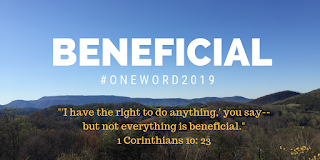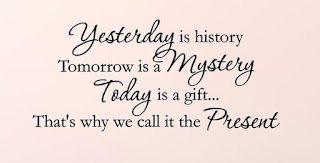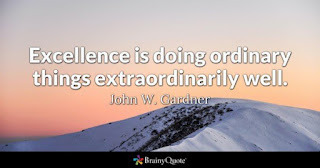For the first time in my entire life, I will be ringing in the New Year alone, thanks to Covid. There will be others in my house, but I am in quarantine in my basement at least until Sunday (or until I am symptom-free). I've been in isolation since being diagnosed on Wednesday night. While I'm beyond thankful to be home rather than a hospital, I hate not being able to hug and kiss my loved ones at midnight. The isolation, however, has given me lots of time to ponder the future and whatever 2022 may bring.
Since learning of the One Word movement in 2014, I've ditched New Year's resolutions and I instead focus on a word that aligns with my needs and priorities for the coming year. Tonight I'd like to reflect on the words I selected for the last few years, their significance, and the quotes or Bible verses that helped me identify the word for the year. I will start with 2018 because honestly, prior to that I was just jumping on the bandwagon and didn't internalize my word as I did starting in 2018. I'll also link to the blog post where I originally shared my word for the new year (except for 2021 which I only shared on a tweet).
2018 - Forward
2017 was a rough year for me. I made a career move that I later regretted and was not able to go back despite several attempts to do so. As I struggled greatly with regret, I felt God tugging at my heart to just put the past behind me and move forward. This was a very impactful word and enriched my life greatly.
2019 - Beneficial
By the fall of 2018 I was in my second year as a facilitator but in a slightly different position at a new school, so it was as if I was repeating my first year as a facilitator and still feeling a bit green and overwhelmed with all the various facets of my role. The word beneficial helped me to focus on that which was truly beneficial to my teachers and to me, rather than just trying to check off all the boxes. It was helpful both professionally and personally.
2020 - Present
At the beginning of the year, I felt that I needed to be more present in the moment and more present to those I did life with. However, in March of 2020 when Covid turned our world upside down and we had no idea what was happening from one day to the next, the word present saved my sanity and helped me to just take life one day at a time, live every moment to the fullest and enjoy my time with my loved ones.
2021 - Ordinary
Covid took the wind out of my sails, leaving me feeling lost - just like most people. In fact, coaching and supporting my teachers often meant taking ordinary duties off their plates so they could teach. And all those extras that the pandemic added to our plates, from sanitizing to covering classes and everything else, not only caused stress and frustration but had me feeling subpar. And while it felt a little demoralizing, I learned that excellence is not about being a rock star, but rather about doing my best in big and small things, even in tasks that aren't in my job description. I quickly learned to redefine teamwork and find pride and joy in ordinary things. This was crucial not only in keeping my attitude in check, but also for my social and emotional well-being. When I found the quote below, I knew ordinary was going to be my word and it really carried me in 2021.
For 2022, I want to be ready for "whatever" life may bring. I'm building on all these words. I continue to move forward, focus on what's truly beneficial, make the most of the present, and revel in the ordinary. Life has been hard and it's easy to get caught up in negativity. I don't know if things will start to stabilize or if more changes will rock our world. I don't know how my life or my role may change but whatever happens, whatever I do, I want to keep an open mind and give it my all.


















